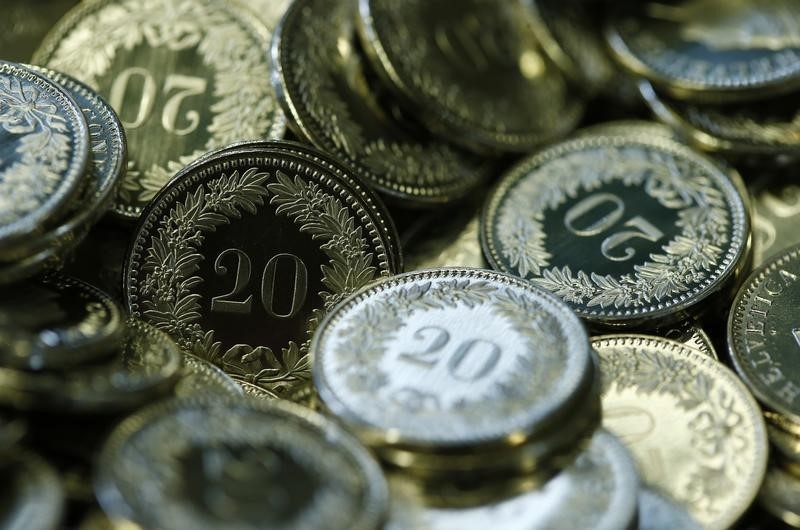By Marcin Goclowski and Adrian Krajewski
WARSAW (Reuters) - Poland's banks are bracing for a fight to hold on to their earnings after next Sunday's election.
They have long prided themselves on offering customers the latest in online money management and helping Poland's economy dodge the recession that gripped others in Central Europe after the global financial crisis.
But they did not sidestep the Swiss franc mortgages whose low interest rates captivated many households in the region during the credit boom of the mid-2000s. With the franc much stronger now than it was then, Poles are demanding more manageable repayment terms - at the banks' expense. Having claimed Poland's presidency in May, the opposition Law and Justice party (PiS) is leading the field before an Oct. 25 parliamentary election, running on a manifesto that could cost the banks more money than they made last year. The debate has already stalled mergers and hit the shares of Polish banks, which are 60 percent foreign-owned.
The central bank estimates the cost at over 21 billion zlotys ($5.6 billion), five billion more than the banks' 2014 profits.
But "according to our estimates, the total impact for the banking sector will amount to several tens of billions of zlotys," said Zbigniew Matosek, manager at advisers Ernst&Young.
"The result for banks and the economy will primarily be reduced lending. It can also translate into an increase in fees for customers," he said in an emailed comment. The Swiss central bank's abrupt move in January to abandon a cap on the franc's value hurt hundreds of thousands of borrowers across central and eastern Europe. They include over half a million Poles holding franc mortgages worth eight percent of national output. With an election approaching, politicians promised to make the banks help them out.
"Banks have had a privileged position," said Mariusz Zajac, chief secretary of the social movement Stop Banking Lawlessness, which has 1,200 followers. "If parties, be it right or left, run their campaign by saying that banks' privileges should be curbed then that's how it should be." Banks say record low interest rates, a regulatory cut in credit card fees and other measures have already begun to chip away at their profits. They are resisting bearing some or all of the cost of converting $39 billion-worth of Swiss franc mortgages into Polish zlotys. The ruling Civic Platform (PO) says banks should share some of the cost. But conservative PiS, eyeing a return to power after eight years in opposition, says bankers should foot the bill almost entirely.
The party is promising new taxes on lenders as well. Polish President Andrzej Duda, who was backed for the post by PiS, told Reuters in August that banks should bear the burden of the franc problem, saying they make "huge profits" in Poland. A senior economic source considered close to PiS told Reuters: "Banks are damn important and one cannot forget that. But they failed to propose a fair common solution to the problem and there is huge political pressure to bite them, no matter if it is stupid or not." The source played down the cost, saying: "The only harm will be that dividends for foreign owners will be smaller."
'COME TO THEIR SENSES'
But the loan debate has already knocked 14 percent off the value of Polish lenders (BNKI). Their ratio of market price to book value is still twice that of their mother banks, but PiS plans for new taxes to finance social benefits could erode that. The party estimates the new levies, targeting bank assets or financial transactions, would cost lenders up to an additional five billion zlotys. Polish banks have paid 23 billion zlotys in corporate income tax since 2008. "A tax on a scale of 1-2 billion zlotys a year would be fine," said Pawel Borys, a chief strategist at Poland's No.1 bank, PKO (WA:PKO). "But above – it might negatively influence the stability of some banks, lending and economic growth." Poland's $535 billion economy is forecast to grow by 3.5 percent next year.
Credit Agricole (PA:CAGR)'s chief Warsaw economist, Jakub Borowski, said the FX conversion and bank tax combined may "cost Poland 0.5 percentage points of 2016 GDP growth."The PiS approach echoes to a degree that of Hungary's Prime Minister Viktor Orban, who has squeezed foreign banks for years. But even his government has offered some relief recently, seeking to spur economic growth.

There is much sympathy for the franc borrowers. "Some financial institutions were very good at making their extraordinary profits granting such FX loans. Banks ... may have exposed customers to considerable risks they had not been shown," said Andrzej Sadowski, head of the Centrum im. Adama Smitha think tank. But bankers hope politicians will relent once the votes are cast. "Once economic growth starts to hover around 2.5 percent rather than 3.5, and problems arise in selling treasury bonds, everyone will come to their senses," said a banking source, speaking on condition of anonymity.